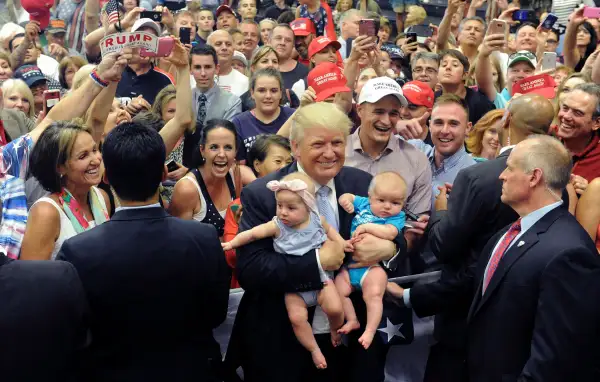What Donald Trump's Child Care Tax Plan Means For You

Last week in Virginia, GOP presidential nominee Donald Trump jokingly asked the mother of a crying baby to leave his rally. On Monday in Detroit, Trump announced a striking child care policy that puts him at odds with the rank and file of his party.
"As part of this new future, we will also be rolling out proposals to increase choice and reduce cost in child care, offering much-needed relief to American families," Trump told the Detroit Economic Club. "I will unveil my plan on this in the coming weeks that I have been working on with my daughter Ivanka and an incredible team of experts." He pledged to enact a policy allowing families "to fully deduct the average cost of child care spending."
What that would mean for you, given existing tax deductions and credits for child care expenses, remains hazy. He said it would provide "much needed relief to the American family. They're suffering."
Trump's new plan outline is one part of a larger economic speech that was largely standard Republican fare, such as lower taxes on businesses and wealthy family estates. He also proposed a pause on financial regulations and reiterated his opposition to trade deals, like the Trans-Pacific Partnership.
In many ways, though, the child care portion of Trump's speech is the most interesting. If you look for the term "child care" in the 2016 GOP party platform, your search will come up empty. Almost all Republicans voted against extending paid family leave to federal workers in 2009, and the two people atop the GOP ticket, Trump and vice presidential nominee Mike Pence, both have voiced qualms about working parents in the past.
During a deposition when a lawyer requested a break to breast pump, Trump called her "disgusting." He has also said that "putting a woman to work is a very dangerous thing." Pence, meanwhile, penned a letter to the editor in 1997 in which he wrote about working mothers: “Sure, you can have it all, but your day-care kids get the short-end of the emotional stick.” He said that he wasn’t condemning families who go this route, but was rather “criticizing a culture that has sold the big lie that ‘Mom doesn’t matter.’”
Trump's announcement comes on the heels of the speech given by his daughter Ivanka Trump at the Republican National Convention last month, touting her father's dealings with women employees.
“At my father’s company, there are more female than male executives, women are paid equally for the work that we do, and when a woman becomes a mother she is supported, not shut out,” the real estate scion said. She went on to support “quality child care affordable and accessible for all." Many political commentators noted that this portion of her speech is something more commonly heard at a Democratic National Convention.
Hillary Clinton, the Democratic nominee, has supported a plan to limit child care expenses to no more than 10% of a family's income.
America is the one advanced nation on earth without guaranteed paid family leave, and child care can cost more than college tuition in many states. Will some relief be in order?
Unfortunately, Trump's plan is short on details, and it's impossible to gauge how your tax burden will be affected.
"There's really no way to know what it means until the specifics are released," says CPA Mike Piper and author of the Oblivious Investor blog.
Why? Because there are already a number of tax deductions and credits present in the tax code.
"Currently, parents who work (or look for work) while paying for child care can take advantage of the child and dependent care credit," says Piper. "Would Trump's plan replace this credit with a deduction? Would the deduction be in addition to this credit? Or would it work like college expenses currently work, where people have the option of claiming a credit or a deduction?"
Plus, there are questions left unanswered about how the deduction would work.
"Would the deduction be an itemized deduction or an 'above the line' deduction, which can be claimed even by people using the standard deduction?" says Piper. "Also, would there be an income limit on the deduction? Would it get phased out for taxpayers as their income increases through a certain range (as happens for many tax breaks)?"
Also, lower income families might not benefit from the plan since they don't pay federal income taxes in the first place.
"If it replaces the credit, it may end up making child care more expensive for certain families, especially those with lower incomes," says financial planner Matt Becker. "A tax deduction may not be as helpful for those families since their tax rate is low and they would therefore only get a smaller break."
Also a deduction isn't a synonym for free.
"It's like getting a discount at the rate of your tax bracket," says Becker. "If you're in the 15% tax bracket, you would essentially be getting 15% off your child care expenses, paid to you in the form of a smaller tax bill."
And that doesn't even include the politics. How will President Trump convince congressional Republicans, who generally don't support tax relief for working parents and want to limit the scope of government, to adopt his plan?
While Trump's plan is interesting, it's rather useless for working parents until he at least attempts to answer these questions.
